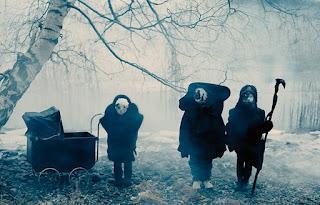So. Hi.
I've been remarkably absent from the blogosphere lately-- both posting and commenting. In fact, I've been remarkably absent from my computer at all. I haven't actually written anything for over a month. I bailed on NaNo when I realized at 15,000 words that it is practically impossible for me to enjoy pantsing a story anymore, along with other...things. All of this absentee-ism is due to the fact that it is remarkably hard to have any mental creative energy when my body is otherwise engaged in different activities of creation.
It takes a lot of energy to create a new little person.
I'm so excited to have baby number two on the way. The Kiddo is excited for a "buddy," and the Hubs tells me he is excited to be on our way toward having ten kids (HA! Not.). Other things that currently get me excited are sleep, eating my weight in crackers and animal cookies so I don't constantly feel sick, and sleep.
So. I'm taking the rest of my first trimester off from blogging completely. I'll be back here around early January with more posts about the oodles of writing stuff I've learned lately (you know, from all that not-writing...), and ready to see what all you other blog-y people have been up to!
So, my friends, in the meantime I'll still be on Facebook and Twitter. Enjoy the holidays, and see you in January!
I've been remarkably absent from the blogosphere lately-- both posting and commenting. In fact, I've been remarkably absent from my computer at all. I haven't actually written anything for over a month. I bailed on NaNo when I realized at 15,000 words that it is practically impossible for me to enjoy pantsing a story anymore, along with other...things. All of this absentee-ism is due to the fact that it is remarkably hard to have any mental creative energy when my body is otherwise engaged in different activities of creation.
It takes a lot of energy to create a new little person.
I'm so excited to have baby number two on the way. The Kiddo is excited for a "buddy," and the Hubs tells me he is excited to be on our way toward having ten kids (HA! Not.). Other things that currently get me excited are sleep, eating my weight in crackers and animal cookies so I don't constantly feel sick, and sleep.
So. I'm taking the rest of my first trimester off from blogging completely. I'll be back here around early January with more posts about the oodles of writing stuff I've learned lately (you know, from all that not-writing...), and ready to see what all you other blog-y people have been up to!
So, my friends, in the meantime I'll still be on Facebook and Twitter. Enjoy the holidays, and see you in January!





































 "I'm a wife to the best husband, a mother to the cutest kids, an aspiring author, an avid reader, a friend, and a daughter of God. I absolutely love to watch old movies, eat anything sweet, and play my music way too loud."
"I'm a wife to the best husband, a mother to the cutest kids, an aspiring author, an avid reader, a friend, and a daughter of God. I absolutely love to watch old movies, eat anything sweet, and play my music way too loud."



